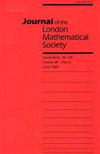A variational method for functionals depending on eigenvalues
IF 1.2
2区 数学
Q1 MATHEMATICS
Journal of the London Mathematical Society-Second Series
Pub Date : 2025-09-30
DOI:10.1112/jlms.70315
引用次数: 0
Abstract
We perform a systematic variational method for functionals depending on eigenvalues of Riemannian manifolds. It is based on a new concept of Palais–Smale (PS) sequences that can be constructed thanks to a generalization of classical min-max methods on functionals to locally Lipschitz functionals. We prove convergence results on these PS sequences emerging from combinations of Laplace eigenvalues or combinations of Steklov eigenvalues in dimension 2.

基于特征值的泛函变分方法
给出了黎曼流形特征值泛函的系统变分方法。它基于palais - small (PS)序列的一个新概念,该概念可以通过将经典的C 1$ \mathcal {C}^1$泛函的最小-极大方法推广到局部Lipschitz泛函来构造。我们证明了由2维拉普拉斯特征值的组合或Steklov特征值的组合产生的这些PS序列的收敛性结果。
本文章由计算机程序翻译,如有差异,请以英文原文为准。
求助全文
约1分钟内获得全文
求助全文
来源期刊
CiteScore
1.90
自引率
0.00%
发文量
186
审稿时长
6-12 weeks
期刊介绍:
The Journal of the London Mathematical Society has been publishing leading research in a broad range of mathematical subject areas since 1926. The Journal welcomes papers on subjects of general interest that represent a significant advance in mathematical knowledge, as well as submissions that are deemed to stimulate new interest and research activity.

 求助内容:
求助内容: 应助结果提醒方式:
应助结果提醒方式:


